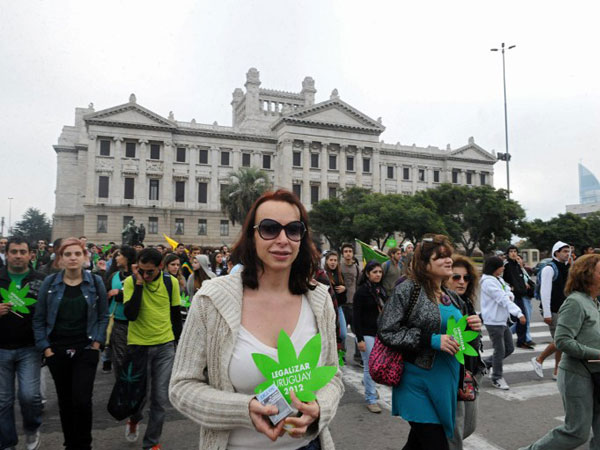Uruguay to make big splash by legalizing marijuana

People take part in a march for the legalization of cannabis in front of the Legislative Palace in Montevideo, on May 5, 2012, as part of the 2012 Global Marijuana March which is being held in hundreds of cities worldwide. AFP /MIGUEL ROJO
MONTEVIDEO— Uruguay will write a piece of history next week when the small South American nation becomes the first country in the world to legalize marijuana, launching a social experiment as part of a broad strategy to combat drug trafficking.
The green light will come Tuesday with a vote in the Senate. The lower chamber of Congress already passed the bill in August, and passage in the upper house is assured because the ruling leftist Broad Front coalition controls both.
The plan was unveiled a year and a half ago by President Jose Mujica along with other measures designed to halt crime and violence associated with the drug trade.
“This is an experiment”, Mujica told AFP in August.
“We can make a real contribution to humanity. Be a testing ground with a series of measures to confront the problem and provide tools to fight drug addiction,” he said.
Article continues after this advertisementThe law will give the government control and regulatory power over imports, growing, harvesting, distribution and sales of pot and its derivatives.
Article continues after this advertisementAfter signing up, people 18 and older will be able to grow up to six marijuana plants, obtain the drug in marijuana smoking clubs and buy up to 40 grams a month in pharmacies.
The change adds to other big ones in the country: legalization of abortion and gay marriage.
But not everyone is thrilled by the idea of legalizing marijuana. A poll carried out in September found 61 percent of those surveyed do not approve.
Neighbors Brazil and Argentina have expressed surprise, and questions have been raised over what the effect would be if such a law were passed in countries torn and bloodied by drug trafficking, such as Colombia and Mexico.
“There is not a lot of crime associated with the issue in Uruguay, so the change is not a major one. It is basically an experiment, but not an experiment that can be replicated easily” in larger countries, said Steven Dudley, co-director of the website InSightCrime, which specializes in drug trafficking in Latin America.
Uruguay frames the initiative as part of the stance of an international drug commission whose members include former presidents Cesar Gaviria of Colombia and Ernesto Zedillo of Mexico and which has concluded that the war on drugs has failed.
Mujica, a former leftist guerrilla who is now 78, reckons that his country spends around $80 million a year fighting drug trafficking and housing prisoners convicted of drug related crimes.
As the law stands now in Uruguay, consuming drugs is not illegal but selling them is. Pot is the most common of illegal drugs here and consumption of it has doubled in the past 10 years.
Authorities say there are some 128,000 marijuana smokers in this country, but pot consumer groups but the figure higher, at 200,000.
Lower price, higher quality
The government hopes to lure consumers with pot that is cheaper and of better quality than what is sold on the streets.
“We are to be keeping in mind the prices on the black market, until we start to dismantle the functioning of that market,” said Julio Calzada, secretary general of the National Drug Board.
Uruguayan doctors are divided. Some say the change will lower consumption of more dangerous drugs, while others argue that it ignores the pernicious effects of smoking pot.
“When this law is approved, the message you are sending to the entire nation is that it is a drug but it is less bad than other drugs and therefore it is OK to consume it,” said psychiatrist Pablo Trelles, who works with young drug addicts.
Opposition lawmakers say there is the risk that consumption will rise.
Not all pot smokers are convinced, either. Some do not like the idea of having to sign up to get pot.
Calzada admits the biggest risk is that regulation “can cause consumption to rise if we do not conduct the controls well.”
The world watching Uruguay
Specialists are not of one mind, either.
“I think Uruguay can push the international discourse, the international scientific and policy discourse, on how to develop more reasonable, more effective ways of drug control,” said Hanz-Joerg Albrecht, director at the Max Planck Institute for Foreign and International Criminal Law.
He said the biggest risks are a rise in consumption and health problems, but warned it is hard to determine cause and effect in these cases.
But Arjan Roskam, head of Holland’s Green House, the world’s biggest marijuana seed bank, said that if the regulation is done “in a very socialist way it will not work.”
Roskam, one of the experts consulted by the government of Uruguay, told AFP that if everything depends on the state and sales to tourists are not allowed, there will still be street dealing and the black market problem will not be solved.
“So you do something very good, you regulate cannabis but you do not solve the dealing in the streets,” he said.